Key takeaways:
- Brew time significantly impacts the flavor profile of coffee, with optimal steeping usually between 4-5 minutes for methods like French press.
- Key factors affecting brew time include grind size, water temperature, and coffee-to-water ratio, each requiring careful adjustments for desired taste.
- Personal preference plays a crucial role in coffee brewing; experimenting with brew times can lead to unique flavor experiences tailored to individual tastes.
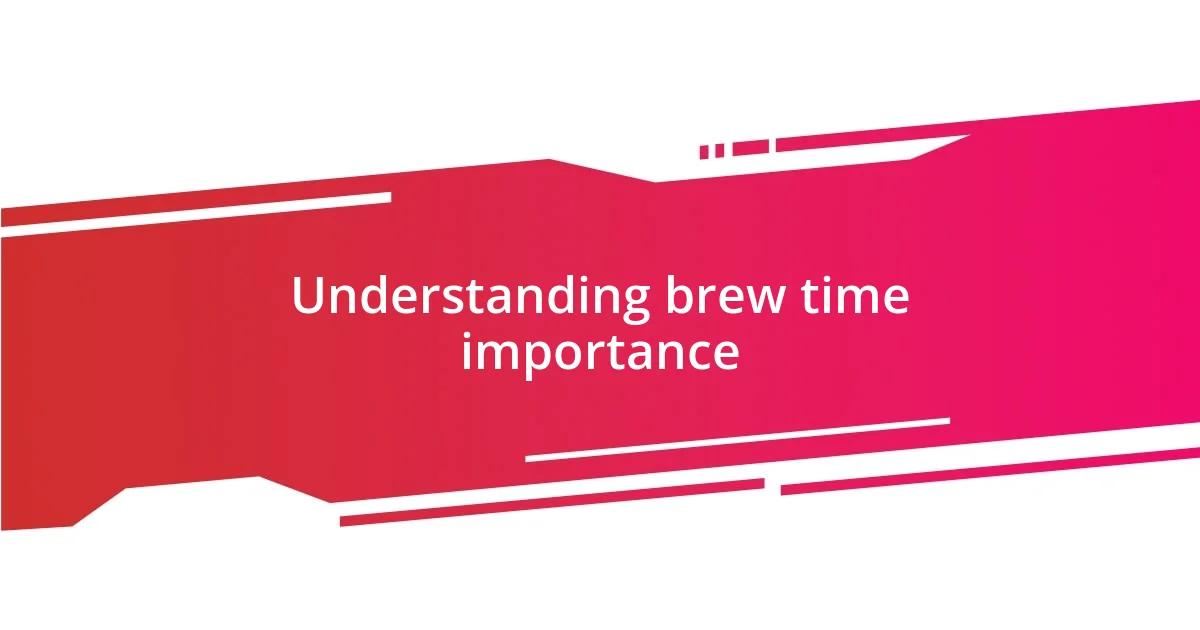
Understanding brew time importance
Brew time is crucial because it determines how flavors are extracted from coffee grounds, affecting everything from aroma to taste. I remember my early days of brewing when I often rushed the process, thinking that quicker meant better. It wasn’t until I allowed my coffee a full four minutes to steep that I finally tasted the rich, complex notes I had been missing.
Have you ever sipped a cup that made your heart flutter with joy? That’s the magic of perfectly timed brewing; it’s about crafting an experience. I often find myself savoring the moment, allowing the coffee to interact with the water just long enough to awaken those vibrant flavors.
Moreover, understanding the significance of brew time can transform your daily ritual into a mindful practice. When I fully embraced the timing, I noticed not just an improvement in taste, but a deeper appreciation for the entire brewing process itself. Isn’t it fascinating how a simple adjustment can lead to such profound satisfaction?
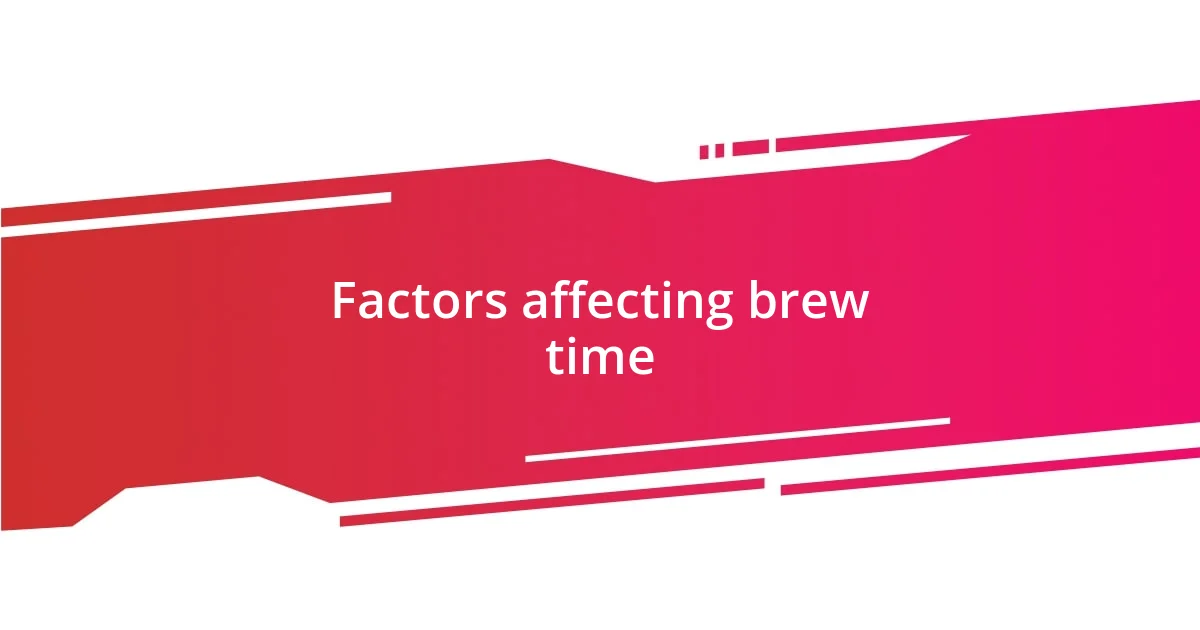
Factors affecting brew time
Several factors play a pivotal role in determining brew time, which can dramatically alter the final flavor of your cup. From my experience, one key element is the grind size of your coffee beans. Finer grinds extract flavors more quickly, while coarser grinds take longer, requiring you to adjust your brew time accordingly. I remember experimenting with different grind sizes, and it was eye-opening to see how a slight change could enhance or diminish the coffee’s character.
Other factors influencing brew time include water temperature and the coffee-to-water ratio. If the water is too hot, it can over-extract the coffee, making it bitter, while cooler water might result in under-extraction, yielding a sour taste. Ensuring the right balance can be a game-changer. Here’s a quick overview of these factors:
- Grind Size: Finer grinds lead to quicker extraction; coarser grinds require longer brew times.
- Water Temperature: Ideal temperatures typically fall between 195°F to 205°F (90°C to 96°C); anything too high or low affects extraction.
- Coffee-to-Water Ratio: Adjusting this ratio allows you to manage brew intensity and flavor complexity.
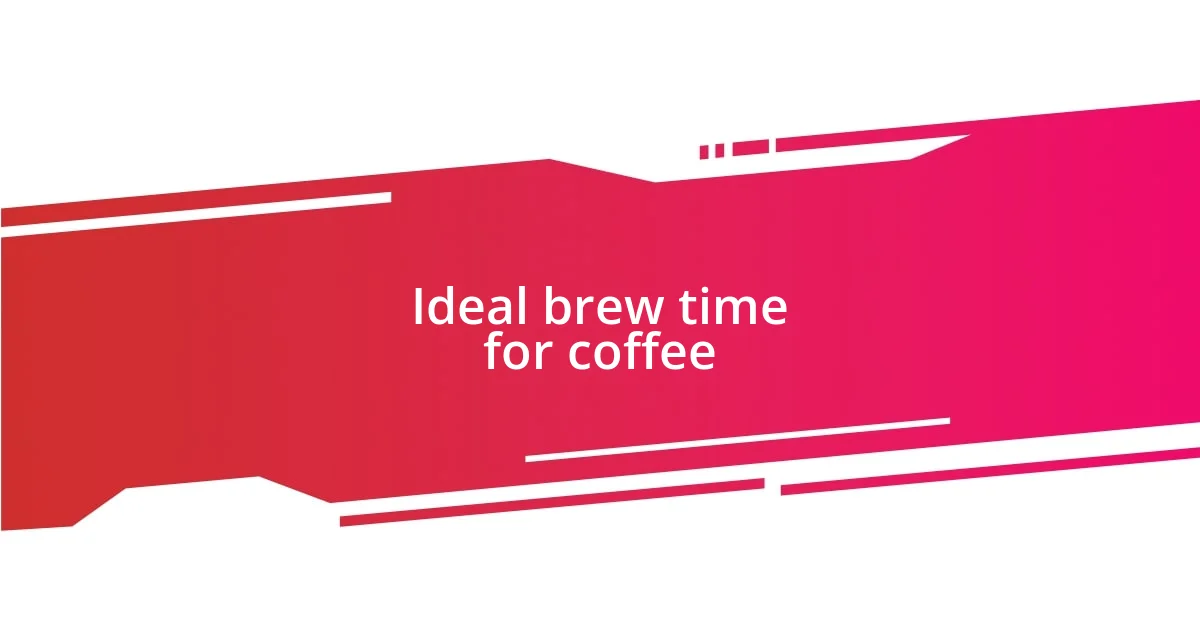
Ideal brew time for coffee
When it comes to the ideal brew time for coffee, I really find that timing can be the secret ingredient to your perfect cup. Personally, I’ve discovered that around four to five minutes of steeping does wonders. It allows for a satisfying balance between all those tantalizing flavors without veering into bitterness. I recall one morning when I experimented with an extra minute, and the result was a robust cup that made me rethink my brewing routine entirely.
My experience has shown that different brewing methods come with their own recommended brew times. For instance, when I switched to a French press, I quickly learned that letting it steep for about four minutes enhanced the coffee’s body and richness. Conversely, with a pour-over, I’ve found shorter times—around two to three minutes—yield a cleaner, brighter flavor. Isn’t it amazing how these small variations can change your experience?
To illustrate, here’s a quick comparison of brew times based on various methods:
| Brew Method | Ideal Brew Time |
|---|---|
| French Press | 4-5 minutes |
| Pour-Over | 2-3 minutes |
| Espresso | 25-30 seconds |
| Coffee Maker | 5-6 minutes |
Experimenting with these times has transformed my coffee moments, as I intentionally savor each cup, feeling more connected to the art of brewing in the process. What about you? Have you played around with brew times to find that perfect balance?
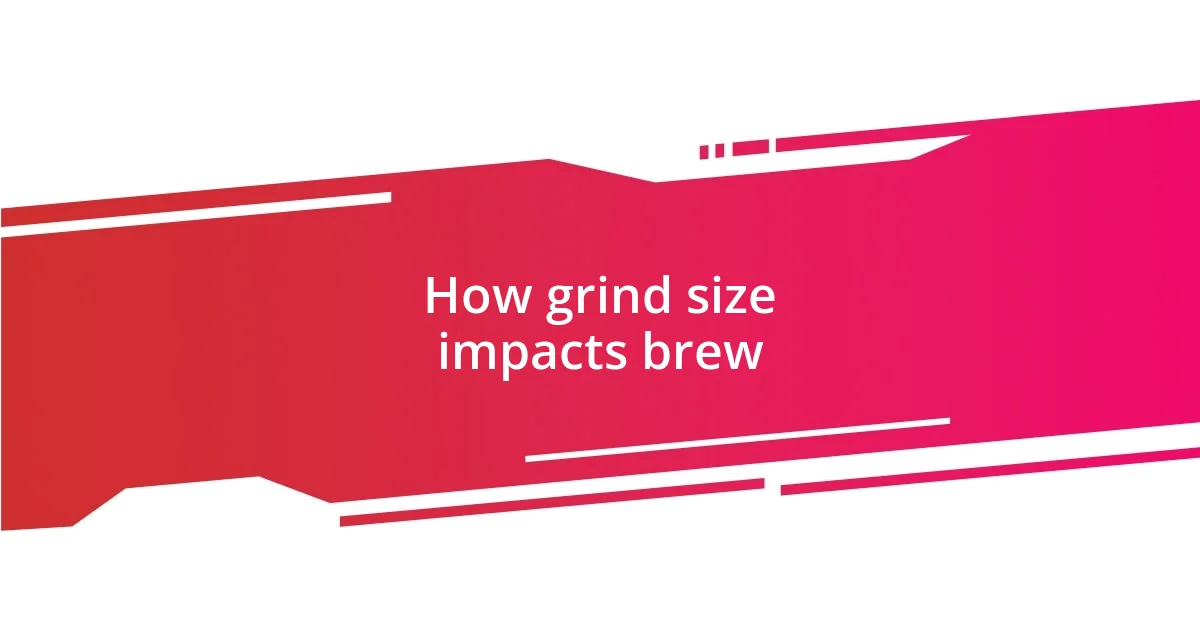
How grind size impacts brew
Grind size is one of those fascinating elements in coffee brewing that I’ve truly come to appreciate. When I started my coffee journey, I initially thought any grind would do, but then I tried using a finer grind for my pour-over. The difference was stunning; the flavors burst forth so vividly. Suddenly, the nuances of the beans I had chosen really started to shine. Have you ever experienced that moment when you realize you’ve been missing out on so much?
As I continued experimenting, I noticed that coarser grinds lead to a smoother, milder cup but required me to adjust my brew time significantly. One afternoon, I made a French press with a coarser grind and let it steep for a solid five minutes. I was amazed at how the body of the coffee was more pronounced, yet the flavors danced without overpowering bitterness. It’s incredible how a simple tweak in grind size can reshape the entire experience, isn’t it?
I’ve often wondered—can the wrong grind size be a dealbreaker? In my experience, absolutely! I recall a time when I rushed my brew, using a fine grind for a quick espresso. The result was an over-extracted, bitter mess that left me regretting my hurriedness. The moral of my brewing story is clear: adjusting the grind size in line with your chosen method can be the key to unlocking a harmonious cup that speaks to your taste preferences. Isn’t it rewarding to discover these little secrets in the journey of brewing?

Temperature’s role in brewing
Absolutely, let’s dive into the fascinating role temperature plays in brewing. When I first began brewing my own coffee, I underestimated how crucial the right temperature is. I learned that water that’s too hot can extract undesirable flavors, like bitterness, while water that’s too cool might leave you with a flat and underwhelming cup. I remember a day when I tried brewing with boiling water—what a mistake! The coffee turned out harsh, and I had to quickly dial it back to a more moderate range.
From my experience, the ideal brewing temperature for coffee usually falls between 195°F and 205°F (90°C to 96°C). I’ve found that this range balances the extraction effectively, allowing the coffee’s natural oils and flavors to develop beautifully. After tweaking my brew temperature, I noticed an incredible transformation. A once ordinary cup turned into an aromatic masterpiece, and I felt like a barista in my own kitchen. Have you ever had a cup that made you truly appreciate the brewing process?
Interestingly, different brewing methods can also require slight adjustments in temperature. For instance, I discovered that colder brewing methods, like cold brew, use room temperature or even cold water, which creates a totally different flavor profile over an extended steep. It’s a fun twist that made my coffee exploration even richer. What about you? Have you experienced the subtle nuances that arise from the right brewing temperature?
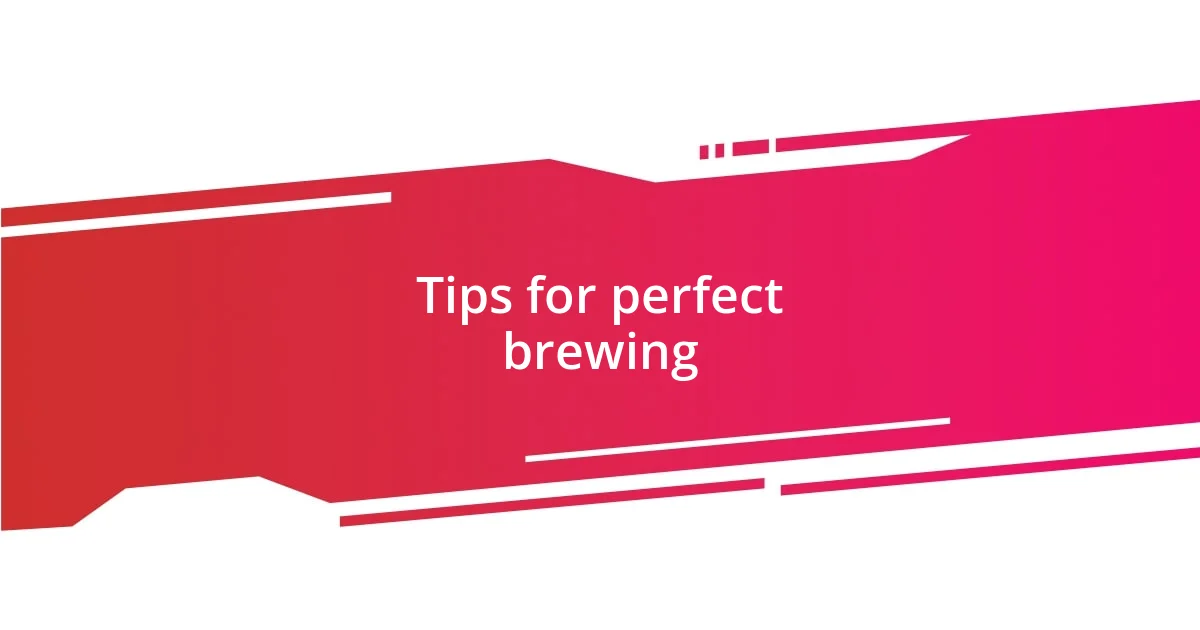
Tips for perfect brewing
When I first delved into the world of brewing times, I was surprised at how impactful a few seconds could be. I experimented with my pour-over and discovered that even a 30-second difference created a noticeable shift in flavor. The shorter brew felt brisk and lively, while extending it made for a deeper, more complex cup. Have you ever waited just a minute longer, only to discover a richer experience at the bottom of your cup?
One significant lesson I learned was to always trust your taste buds. On a chilly morning, I decided to brew a batch that had been steeping for three minutes. As I sipped, the delightful notes of chocolate burst through. Yet, it wasn’t until I mistakenly left a batch for four minutes that I realized the coffee became overwhelmingly acidic. It reminded me how personal preference plays such a vital role in brewing. Have you ever stumbled upon a perfect brew by pure accident?
I’ve also come to appreciate the rhythm of timing in my coffee routine. Setting a timer while brewing has eliminated uncertainty and turned the process into a mindful ritual. It’s almost meditative for me, focusing my energy on watching as the coffee transforms. Have you tried timing your brews? You might find that it adds a delightful structure to your coffee-making experience that can elevate your enjoyment!
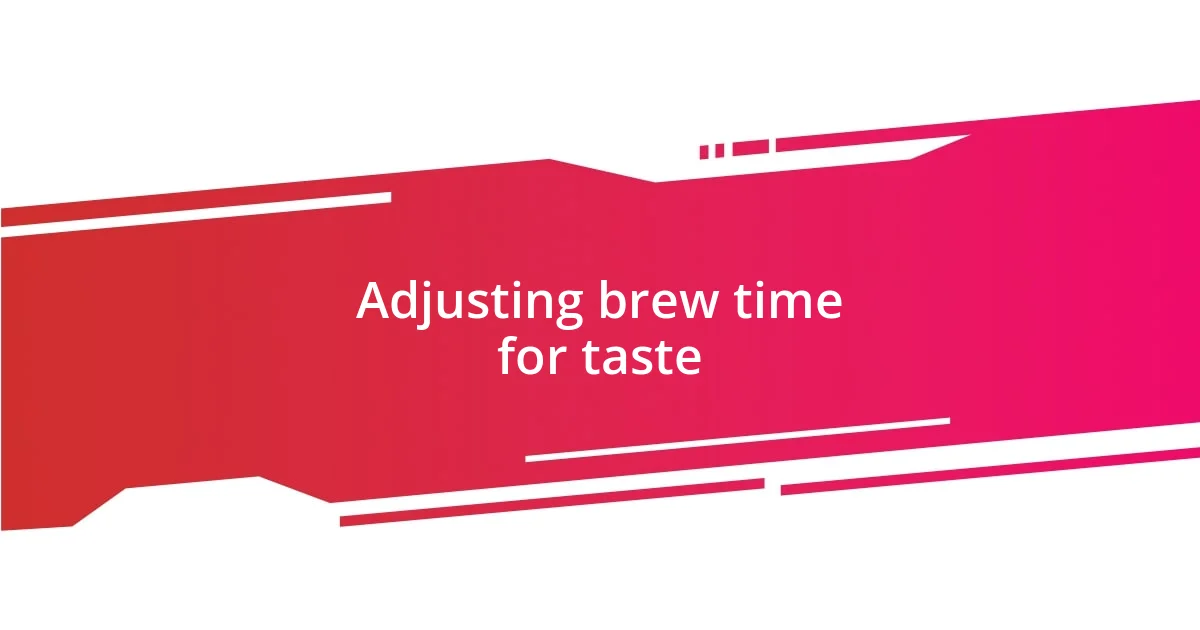
Adjusting brew time for taste
Adjusting brew time can dramatically alter the taste of your coffee. I once read about the impact of brew time and became curious. So, one morning, I decided to experiment with a French press, brewing for three, four, and then five minutes. To my surprise, the three-minute brew was bright and vibrant, while the four-minute mark introduced some lovely depth. The five-minute version, however, felt like a flavor assault—overly strong and a bit unbalanced. It made me wonder, have you ever stretched your brew time and regretted it just a tad?
Through my trials, I’ve realized that taste is supremely subjective. There are days when I crave a cup that is robust and intense, while other mornings call for something lighter. I recall a dreary afternoon when I desperately needed a warm hug in a mug. I brewed my coffee for an extra minute, and wow, the flavors bloomed beautifully! It was like wrapping myself in a soft blanket. Have you ever tuned into your mood to tweak your brew time?
I’ve also observed that every coffee bean tells its own story, often asking for a specific brew time to shine. I once used a single-origin Ethiopian coffee that, when brewed for just two minutes, kept its fruity notes alive, but extending it to three minutes turned it muddy and dull. It’s a reminder that each brew is a little adventure, unique to the combination of bean and technique. Have you felt the joyous adventure that experimenting with timing can bring to your brewing?















